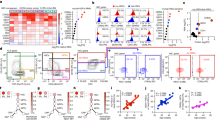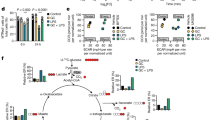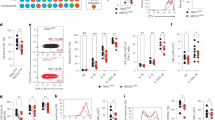Abstract
Genetic susceptibility and autoimmunity triggered by microbial infections are factors implicated in the pathogenesis of dilated cardiomyopathy, the most common cause of heart failure in young patients. Here we show that dendritic cells (DCs) loaded with a heart-specific self peptide induce CD4+ T-cell-mediated myocarditis in nontransgenic mice. Toll-like receptor (TLR) stimulation, in concert with CD40 triggering of self peptide–loaded dendritic cells, was shown to be required for disease induction. After resolution of acute myocarditis, DC-immunized mice developed heart failure, and TLR stimulation of these mice resulted in relapse of inflammatory infiltrates. Injection of damaged, syngeneic cardiomyocytes also induced myocarditis in mice if TLRs were activated in vivo. DC–induced myocarditis provides a unifying theory as to how tissue damage and activation of TLRs during infection can induce autoimmunity, relapses and cardiomyopathy.
This is a preview of subscription content, access via your institution
Access options
Subscribe to this journal
Receive 12 print issues and online access
$209.00 per year
only $17.42 per issue
Buy this article
- Purchase on Springer Link
- Instant access to full article PDF
Prices may be subject to local taxes which are calculated during checkout





Similar content being viewed by others
References
Roig, E. et al. Serum interleukin-6 in congestive heart failure secondary to idiopathic dilated cardiomyopathy. Am. J. Cardiol. 82, 688–690 (1998).
Mann, D.L. Inflammatory mediators and the failing heart: past, present, and the foreseeable future. Circ. Res. 91, 988–998 (2002).
Caforio, A.L., Mahon, N.J., Tona, F. & McKenna, W.J. Circulating cardiac autoantibodies in dilated cardiomyopathy and myocarditis: pathogenetic and clinical significance. Eur. J. Heart Fail. 4, 411–417 (2002).
Rose, N.R., Herskowitz, A., Neumann, D.A. & Neu, N. Autoimmune myocarditis: a paradigm of post-infection autoimmune disease. Immunol. Today. 9, 117–120 (1988).
Feldman, A.M. & McNamara, D. Myocarditis. N. Engl. J. Med. 343, 1388–1398 (2000).
Neu, N. et al. Cardiac myosin induces myocarditis in genetically predisposed mice. J. Immunol. 139, 3630–3636 (1987).
Bachmaier, K. et al. Chlamydia infections and heart disease linked through antigenic mimicry. Science 283, 1335–1339 (1999).
Banchereau, J. & Steinman, R.M. Dendritic cells and the control of immunity. Nature 392, 245–252 (1998).
Mellman, I. & Steinman, R.M. Dendritic cells: specialized and regulated antigen processing machines. Cell 106, 255–258 (2001).
Pulendran, B., Palucka, K. & Banchereau, J. Sensing pathogens and tuning immune responses. Science 293, 253–256 (2001).
Liu, K. et al. Immune tolerance after delivery of dying cells to dendritic cells in situ. J. Exp. Med. 196, 1091–1097 (2002).
Menges, M. et al. Repetitive injections of dendritic cells matured with tumor necrosis factor alpha induce antigen-specific protection of mice from autoimmunity. J. Exp. Med. 195, 15–21 (2002).
Ludewig, B., Odermatt, B., Landmann, S., Hengartner, H. & Zinkernagel, R.M. Dendritic cells induce autoimmune diabetes and maintain disease via de novo formation of local lymphoid tissue. J. Exp. Med. 188, 1493–1501 (1998).
Dittel, B.N., Visintin, I., Merchant, R.M. & Janeway, C.A. Jr. Presentation of the self antigen myelin basic protein by dendritic cells leads to experimental autoimmune encephalomyelitis. J. Immunol. 163, 32–39 (1999).
Donermeyer, D.L., Beisel, K.W. & Allen, P.M. Myocarditis-inducing epitope of myosin binds constitutively and stably to I-Ak on antigen-presenting cells in the heart. J. Exp. Med. 182, 1291–300 (1995).
Means, T.K. et al. Human Toll-Like Receptors Mediate Cellular Activation by Mycobacterium tuberculosis. J. Immunol. 163, 3920–3927 (1999).
Pummerer, C.L. et al. Identification of cardiac myosin peptides capable of inducing autoimmune myocarditis in BALB/c mice. J. Clin. Invest. 97, 2057–2062 (1996).
Rose, N.R. & Bona, C. Defining criteria for autoimmune diseases (Witebskys postulates revisited). Immunol. Today. 14, 426–430 (1993).
Grewal, I.S., Xu, J. & Flavell, R.A. Impairment of antigen-specific T-cell priming in mice lacking CD40 ligand. Nature 378, 617–620 (1995).
Cella, M., et al. Ligation of CD40 on dendritic cells triggers production of high levels of interleukin-12 and enhances T cell stimulatory capacity: T-T help via APC activation. J. Exp. Med. 184, 747–752 (1996).
Josien, R. et al. TRANCE, a Tumor Necrosis Factor Family Member, Enhances the Longevity and Adjuvant Properties of Dendritic Cells In Vivo. J. Exp. Med. 191, 495–502 (2000).
Howard, L.M. & Miller, S.D. Autoimmune intervention by CD154 blockade prevents T cell retention and effector function in the target organ. J. Immunol. 166, 1547–1553 (2001).
Medzhitov, R. & Janeway, C.A. Jr. Decoding the patterns of self and nonself by the innate immune system. Science 296, 298–300 (2002).
Campos, M.A. et al. Activation of Toll-like receptor-2 by glycosylphosphatidylinositol anchors from a protozoan parasite. J. Immunol. 167, 416–423 (2001).
Schulz, O. et al. CD40 triggering of heterodimeric IL-12 p70 production by dendritic cells in vivo requires a microbial priming signal. Immunity 13, 453–462 (2000).
Eriksson, U. et al. Activation of dendritic cells through the IL-1 receptor 1 is essential for the induction of autoimmune myocarditis. J. Exp. Med. 197, 333–341 (2003).
Benoist, C. & Mathis, D. Autoimmunity provoked by infection: How good is the case for T-cell epitope mimickry? Nat. Immunol. 2, 797–801 (2001).
Calabrese, F. et al. Molecular diagnosis of myocarditis and dilated cardiomyopathy in children: clinicopathologic features and prognostic implications. Diagn. Mol. Pathol. 11, 212–221 (2002).
Steinman, R.M. & Nussenzweig, M.C. Avoiding horror autotoxicus: the importance of dendritic cells in peripheral T cell tolerance. Proc. Natl. Acad. Sci. U. S. A. 99, 351–358 (2001).
Turley, S.J. Dendritic cells: inciting and inhibiting autoimmunity. Curr. Opin. Immunol. 14, 765–770 (2002).
Kawabe, T. et al. The immune responses in CD40-deficient mice: impaired immunoglobulin class switching and germinal center formation. Immunity 1, 167–178 (1994).
Magram, J. et al. IL-12-deficient mice are defective in IFNγ production and type 1 cytokine responses. Immunity 4, 471–4781 (1996).
Labow, M. et al. Absence of IL-1 signaling and reduced inflammatory response in IL-1 type I receptor-deficient mice. J. Immunol. 159, 2452–2461 (1997).
Hoshino, K. et al. Cutting edge: Toll-like receptor 4 (TLR4)-deficient mice are hyporesponsive to lipopolysaccharide: evidence for TLR4 as the Lps gene product. J. Immunol. 162, 3749–3752 (1999).
Eriksson, U., Kurrer, M.O., Sebald, W., Brombacher, F. & Kopf, M. Dual role of the IL-12/IFN-gamma axis in the development of autoimmune myocarditis: induction by IL-12 and protection by IFN-gamma. J. Immunol. 167, 5464–5469 (2001).
Kong, Y.Y. et al. Activated T cells regulate bone loss and joint destruction in adjuvant arthritis through osteoprotegerin ligand. Nature 402, 304–309 (1999).
Lutz, M.B. et al. An advanced culture method for generating large quantities of highly pure dendritic cells from mouse bone marrow. J. Immunol. Methods. 223, 77–92 (1999).
Eriksson, U. et al. Interleukin-6-deficient mice resist development of autoimmune myocarditis associated with impaired upregulation of complement C3. Circulation 107, 320–325 (2003).
Crackower, M.A. et al. Angiotensin-converting enzyme 2 is an essential regulator of heart function. Nature 417, 822–828 (2002).
Acknowledgements
This work was supported by grants from the Institute of Molecular Biotechnology and the Swiss National Foundation. U.E. was supported by the Swiss Foundation for Medical-Biological Grants, the Novartis Foundation, AstraZeneca and the Department of Internal Medicine, Basel University Hospital. J.M.P. holds a Canada Chair in Cell Biology.
Author information
Authors and Affiliations
Corresponding authors
Ethics declarations
Competing interests
The authors declare no competing financial interests.
Rights and permissions
About this article
Cite this article
Eriksson, U., Ricci, R., Hunziker, L. et al. Dendritic cell–induced autoimmune heart failure requires cooperation between adaptive and innate immunity. Nat Med 9, 1484–1490 (2003). https://doi.org/10.1038/nm960
Received:
Accepted:
Published:
Issue Date:
DOI: https://doi.org/10.1038/nm960
This article is cited by
-
ANGPTL2 promotes immune checkpoint inhibitor-related murine autoimmune myocarditis
Communications Biology (2023)
-
Myocarditis and inflammatory cardiomyopathy: current evidence and future directions
Nature Reviews Cardiology (2021)
-
VCAM1 expression in the myocardium is associated with the risk of heart failure and immune cell infiltration in myocardium
Scientific Reports (2021)
-
The Role of B Cells in Regulation of Th Cell Differentiation in Coxsackievirus B3–Induced Acute Myocarditis
Inflammation (2021)
-
Mitigated viral myocarditis in A/J mice by the immunoproteasome inhibitor ONX 0914 depends on inhibition of systemic inflammatory responses in CoxsackievirusB3 infection
Basic Research in Cardiology (2021)



